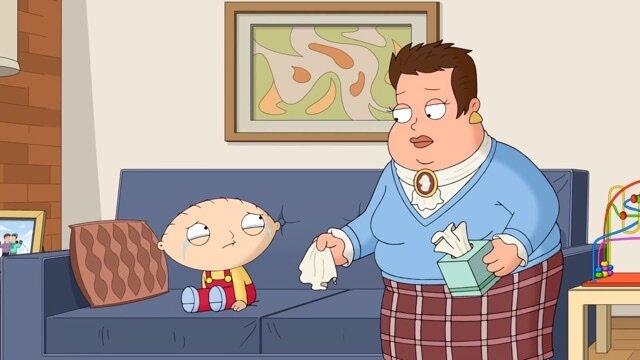A Therapist Reviews Family Guy in therapy
Before I start, let me just say, I love Family Guy. Any time I need a quick pick me up or some company as I complete my chores, you can always catch me throwing on an episode. In fact, as I type, I’ve got Family Guy running in the background. Anyways, imagine my excitement when I see that they’ve dedicated a whole episode to just therapy! In Season 16 Episode 12, “Send in Stewie, Please”, we see Stewie in session with Child Psychologist, Dr. Cecil Pritchfield.
Right from the start, we see Stewie in a classic, stereotypical therapy room. No shade because my office looks the exact same. Classic couch set up, therapist with notepad, notable books on the shelf, a box of tissues, certificates on the wall and your obligatory room plant.
We notice that Dr. Pritchfield is out of tissue. I’ll admit, this has happened to me in the past and I felt so bad for not noticing earlier. I had to step into the reception area and grab a box as my client started to cry in session. Rookie mistake.
After Stewie makes small talk, Dr. Pritchfield starts off by asking “…and why are you here, Stewie ?” I like this opener. A little predictable, as Stewie implies, but it gets the conversation going. I usually start with “How have things been since we last spoke?” Or “Fill me in , what have you been up to?”
Stewie starts by talking about his British accent, which the psychologist doesn’t recognize, annoying Stewie. I assume this is because the psychologist is clearly challenging a large part of his identity or because the psychologist is able to see through Stewie’s mask - stay tuned.
Given what has been shared so far, Dr. Pritchfield guesses that Stewie cares a lot about what others think of him. Stewie does not welcome this assumption considering that they’ve only met for 5 minutes. To retaliate, Stewie decides to play analyst and accurately describes Dr. Pritchfield and his marriage based on what can be found in his office. Needless to say, Stewie was spot on. I was impressed by how long Stewie was able to talk throughout this segment and wondered why Dr. Pritchfield let him talk for so long, uninterrupted. I’m pretty sure I would have stopped him at some point because this feels like deflection (where the client talks about something unrelated so that we don’t have to get deep into the hard stuff). However, after Stewie’s insightful rant, Dr. Pritchfield guess and accurately concludes that Stewie is a lonely young man. What a risky move! I’m surprised that he was able to conclude this even though he could have easily been caught up with defending himself against Stewie’s analysis of him. It’s OK if Dr. Pritchfield was wrong in his conclusion, because it can always be clarified in discussion, but it would not have been as impactful.
Here, in acknowledging this and feeling seen, we see Stewie break down and admit that he is lonely. He looks for tissue and there is none. At this point, Barbara, the receptionist, shows up with a new box of tissues. I don’t know how I feel about this. As a client, I don’t know if I would be comfortable knowing that someone knew to bring me tissues because I was crying so much. I would question just how sound proof the room was. I would suggest a sound machine in Dr. Pritchfield’s reception area to avoid future embarrassment.
After Stewie’s crying bit, we see him taking a few deep breaths to ground himself. This is something we do in the therapy room if we just had an intense moment - which they clearly just did. This is where we can start therapy. Stewie talks about feeling anxious, depressed, and about his sexuality. It’s a nice moment where Stewie reveals more of his true self and even sings to Dr. Pritchfield to show how much he loves the musical, Hamilton. I love when clients show me their hidden talents. It’s a window to a side of them beyond what is brought up in therapy.
In continuing their conversation about fitting in, Dr. Pritchfield engages in self-disclosure, where he shares a personal story about his own experiences. Self- disclosure in therapy is only welcomed when it’s relevant to the session and is for the client’s benefit. Stewie interrupts him as it’s only a 40-minute session and he wants him to get to the point, In this case, self-disclosure was relevant. Dr. Pritchfield’s story of his first kiss was not.
It seems that his self-disclosure was beneficial as we see a break through with Stewie. He decides that he no longer wants to play a role and would like to be himself. He drops his British accent and adopts an American one. I love witnessing these break through moments, or “AHA moments” as I like to call them. You really get to see the exact moment in time where their lives have changed.
We see another “AHA moment” where Stewie decides that he actually doesn’t like this version of himself. In reality, he doesn’t want to be his true self, but a curated, superior version. Hey, if that works for him, then that works for him. Therapists don’t get to tell clients what they “should” do or be like. That’s all up to the client. I wouldn’t argue with Stewie if he changed his mind mid-session.
Unfortunately, at this point, Dr.Pritchfield starts to experience the onset of a heart attack and asks Stewie to pass him his medication. I imagine for the average person, this can be a traumatizing experience, but not for Stewie. He decides not to give his doctor his medication because he is now the only person in the world who knows his true self, and therefore, he can’t exist. Eventually, Dr. Pritchfield passes away.
At the end of the episode we see Stewie in bed, screaming himself awake from a nightmare. He admits to Brian, his dog friend, that he has done something awful but doesn’t want to talk about it. I assume that this may be the beginning of some PTSD -type symptoms and will only result in a greater need for therapy.
Pop culture has a habit of exaggerating therapeutic practices, but I actually liked how Family Guy depicted the process. There was a lot of validation of the client, accuracy in setting and process in a typical visit, and real problem solving. Obviously, some things were a stretch - the client analyzing the therapist for a dominating portion of the session, the receptionist walking into the session, and the murder at the end, but overall, great writing! Can’t complain at all!


